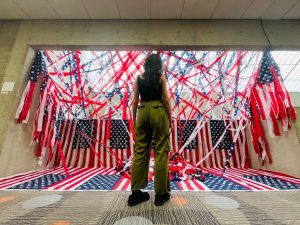Attorneys argue Miranda rights, police custody at oral arguments
October 31, 2017

(L to R) Justices Mark Massa, Steven David, Chief Justice Loretta Rush, Christopher Goff and Geoffrey Slaughter hear arguments from attorneys in B.A. v. State of Indiana.“It took a village to get us down here,” Rush said. “We are the easy part. We’re doing what we are going to do anyway, but we love doing it offsite.”
The campus community was given an opportunity to experience something they may never witness again Monday morning.
The university hosted the Indiana Supreme Court in Carter Hall for the oral arguments in B.A. v. State of Indiana.
“This is a rare opportunity to watch our judicial system at work,” President Linda Bennett said. “I think a lot of the principals that we read about are brought to life because we are able to sit and listen to an actual case being heard.”
The room was filled with university students, faculty, administrators, local politicians, the Evansville Bar Association and students from 11 high schools in the surrounding area.
This was the 44 time the court has heard a case outside of the courthouse in Indianapolis. It normally hears around 70 oral arguments a year. It was the first time the court has visited USI.
“I was very delighted that our USI team was successful in getting the court to hold its hearing here on campus,” Bennett said. “(It was a) terrific opportunity to bring students together to learn about the judicial system.”
The case involved a 13-year-old student. The initials B.A. are used to protect the identity of the student, who was taken to the assistant principal’s office by a school resource officer for interrogation after B.A. falsely reported a bomb threat written on a school wall.
The student was subsequently expelled from school after confessing to writing the threat.
Before trial, B.A.’s attorney argued the state should throw out B.A.’s statements because he was not told of his right to remain silent in the presence of a police officer.
The Marion Superior Court denied B.A.’s request and found him to be a delinquent.
The student’s appeal to the Court of Appeals was unsuccessful and it reasoned a school administrator performed the questioning and he was not subjected to “custodial interrogation” by police.
The question is whether students should be awarded Miranda rights in a school setting if there is a police officer present and if the student was in police custody.
“I believe that the student B.A. was actually indeed under police custody at that time simply because school resource officers were escorting him to the room for question,” junior political science major Grant Edwards said.
Edwards, who said he hopes to become a district attorney someday, said he believes the student should be awarded Miranda rights.
“I believe the defense attorney was lazy with her argument, however, I do believe the public defender did give reasonable question to the justices as well as answering the question,” he said. “When the justices questioned the state, the state was not properly ready to be engaged in those types of questions.”
Sophomore political science major Vanessa Rodriguez served as honorary bailiff for the arguments.
“I was going back and forth,” she said. “I think they did a good job of switching seamlessly between attorneys.”
Rodriguez said she would have ruled in favor of B.A.
The arguments lasted a little less than an hour, with both sides having equal opportunity to present their arguments to the justices.
A question and answer session with the justices followed the arguments though they were not allowed to discuss the case.
Court Justice Geoffrey Slaughter said he slept much easier the night before than he did nine years ago when he was on the other side of the oral arguments as a lawyer arguing in the Court of Appeals.
“This is something everyone can relate to and everybody, even if you are not a trained lawyer, understand the issues and the implications of the case,” he said. “It’s great to see students interested in law, thinking they might want to become lawyers.”
The court was asked to consider nearly 900 cases last fiscal year. It heard 59 oral arguments and handed down 73 majority opinions.
The court will review the case and the arguments made and construct an opinion on the case within the coming weeks.
“When I went to law school I had never met a lawyer or a judge,” Chief Justice Loretta Rush said. “I think it’s important that we peel back the curtains.”
Rush said the reason they travel to different parts of the state is for civic education.
“It took a village to get us down here,” she said. “We are the easy part. We’re doing what we are going to do anyway, but we love doing it offsite.”
Rush said she thought the audience was engaged through the entire argument.
“I was very impressed with USI and the students in the audience,” she said. “We will be back.”







